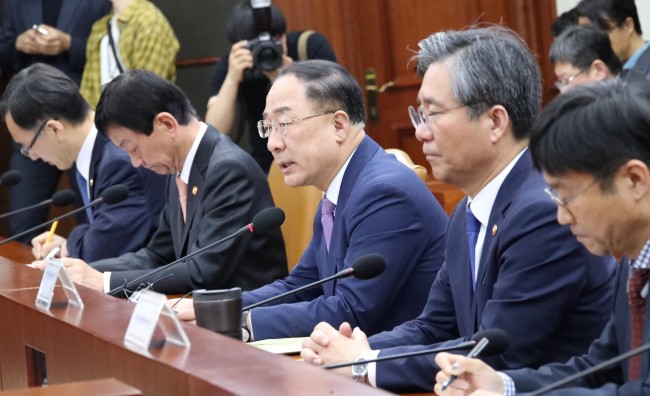South Korea's economy shrinks 0.3% in Q1 2019, worst since global financial crisis
Deputy prime minister holds emergency meeting to pledge all possible policy measures to meet original growth target
By Sohn Ji-youngPublished : April 25, 2019 - 12:31
South Korea’s economy shrank in the first quarter of this year in the biggest contraction since the 2008 global financial crisis, owing to a sharp drop in exports and slowing capital investments, an advanced estimate by the central bank showed Thursday.
According to the Bank of Korea, the country’s gross domestic product for the first three months of 2019 shrank 0.3 percent quarter-on-quarter -- a surprise figure considering the median market forecast of a 0.3 percent gain for the period.
The GDP contraction for the January-March period is the first decline in five quarters and the biggest slump since the fourth quarter of 2008, according to the central bank.
The local economy had grown 1 percent in the October-December quarter of 2018.
According to the Bank of Korea, the country’s gross domestic product for the first three months of 2019 shrank 0.3 percent quarter-on-quarter -- a surprise figure considering the median market forecast of a 0.3 percent gain for the period.
The GDP contraction for the January-March period is the first decline in five quarters and the biggest slump since the fourth quarter of 2008, according to the central bank.
The local economy had grown 1 percent in the October-December quarter of 2018.

Korea’s latest GDP shock was attributed primarily to falling exports, which are on course for a fifth consecutive monthly decline on weakening demand for semiconductors, which comprise 21 percent of Korea’s exports.
Exports dropped by 2.6 percent on decreased exports of electrical and electronic equipment such as memory chips and liquid crystal displays, the BOK said.
Capital expenditure also plunged 10.8 percent, the worst drop since the first quarter of 1998 during the Asian financial crisis. This drop followed 4.4 percent growth in the previous quarter.
Corporations were seen as scaling back their investments due to global uncertainties such as the continued US-China trade war, developments surrounding Brexit and financial instability in developing markets.
Private consumption increased 0.1 percent on the back of rising sales of household appliances and durable goods. Government spending also rose 0.3 percent, with increased health care spending. But these factors were not enough to offset the drop in investment.
On a year-to-year basis, Asia’s fourth-largest economy expanded 1.8 percent in the January-March period, according to the BOK.
The grim GDP outlook came a day after the government approved a 6.7 trillion won ($5.9 billion) supplementary budget to boost the country’s economic growth by 0.1 percentage point this year.
The Ministry of Economy and Finance had allotted the extra budget to boost export financing, fight air pollution and achieve its economic growth target of 2.6-2.7 percent for this year.
Following the BOK’s GDP outlook on Thursday, Deputy Prime Minister and Finance Minister Hong Nam-ki convened an emergency meeting to evaluate the current situation and discuss future action to stimulate economic growth.
“Considering the first-quarter GDP index, (Korea) is facing worse-than-expected domestic and global economic conditions as well as widening downward risks,” Hong said during the meeting.
“We expect an improved outlook for the second quarter,” he said, adding that the government would “utilize all policy measures to meet the original growth target of 2.6-2.7 percent for the year.”
Looking ahead, the deputy prime minister pledged to ensure the timely and effective implementation of the extra budget bill submitted to the National Assembly on Thursday.
The government will also focus on its ongoing economic policies, aiming to forge an improved environment for corporate investment. Steps to draw up pre-emptive measures to address downward economic risks in the latter half of the year will also continue, Hong said.
Last week, the Bank of Korea lowered its growth outlook for the year to 2.5 percent, down from its 2.6 percent outlook in January, citing economic uncertainties and weaker-than-expected exports.
Korea’s economy expanded 2.7 percent in 2018, down from 3.1 percent the previous year.
By Sohn Ji-young (jys@heraldcorp.com)



![[Exclusive] Korean military set to ban iPhones over 'security' concerns](http://res.heraldm.com/phpwas/restmb_idxmake.php?idx=644&simg=/content/image/2024/04/23/20240423050599_0.jpg&u=20240423183955)

![[Graphic News] 77% of young Koreans still financially dependent](http://res.heraldm.com/phpwas/restmb_idxmake.php?idx=644&simg=/content/image/2024/04/22/20240422050762_0.gif&u=)



![[Pressure points] Leggings in public: Fashion statement or social faux pas?](http://res.heraldm.com/phpwas/restmb_idxmake.php?idx=644&simg=/content/image/2024/04/23/20240423050669_0.jpg&u=)









